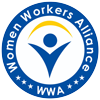WWA and PAIMAN fight for women workers’ rights in Charsadda
Ajwa Medical Complex (AMC) is a prominent healthcare organization in Charsadda District which has a large number of women workers. Despite their strength, however, these women workers had been deprived of some of their basic workers’ rights, such as separate washroom facilities for females, due to which they had to use a combined washroom for both men and women. Charsadda being a conservative area, the women felt hesitation in using such facilities and often avoided them altogether unless absolutely necessary. Moreover, the organization had no anti-harassment committee which could address the complaints of the women workers.
PAIMAN Alumni Trust, as TDEA’s implementing partner in its Enhancing Women Workers’ Access to Markets (EWAM) project, was facilitating the Women Workers’ Alliance (WWA), also established through TDEA’s grant, to search for and identify workplaces that were violating labour laws and the basic rights of women workers. When the issues faced by AMC’s women workers were brought to their attention, the WWA, supported by PAIMAN, decided to take up the cause and launched a multi-pronged advocacy campaign to highlight the women workers’ plight and raise a voice for corrective measures.
Initially, the WWA faced a cultural barrier whereby the aggrieved women workers were hesitant to share their personal information. Some of them feared that by speaking up against their employer, they might lose their jobs. However, the WWA members were able to gain their trust and applied themselves to finding a solution.
WWA members conducted meetings with Labour Department officials as well political influential personalities, including the relevant Members of the Provincial and National Assemblies, Mr Shakeel Bashir Khan Umerzai (MPA) and Mr Fazal Muhammad Khan (MNA), to share the women workers’ concerns and inform them about workplace violators who did not follow the rules and regulations. They also met with the senior management of the AMC to sensitize them about the relevant labour laws and codes of conduct, in the process highlighting the lapses by the organization and the steps they needed to take to rectify the situation, such as forming an anti-harassment committee and separate washrooms for female staff members. The concerted efforts of the project team helped to convince the relevant authorities that these issues needed to be addressed forthwith.
The AMC management proceeded to notify the staff about the formation of an anti-harassment committee and the establishment of a separate washroom for females. The promised changes were duly fulfilled, to the great satisfaction of the women workers.
The WWA succeeded in its efforts to make the women workers and the relevant stakeholders aware of the women workers’ legal rights and subsequently advocate for the resolution of issues arising from their violation.
Ms. Sehrish, staff nurse at AMC, expressed her happiness at these changes by saying, “Before the allocation of a separate washroom, we had to use the combined washroom, which made us feel shy. We even avoided the washroom for our ablutions, due to which we would miss our prayers. So this is a very positive change for us.”
Mr. Altaf Khan, the employer, stated, “Since being provided these basic facilities, the women workers have experienced immense satisfaction and are taking a keener interest in their work.”








